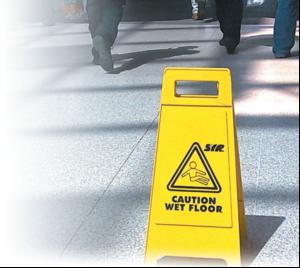Following news that an independent enquiry is being
conducted into Network Rail over allegations of non-reporting
of RIDDOR accidents,Karl Ward asks whether companies
should be more transparent about their safety records
Following news that an independent enquiry is being
conducted into Network Rail over allegations of non-reporting
of RIDDOR accidents,Karl Ward asks whether companies
should be more transparent about their safety records
The news that an independent
review is being conducted into
Network Rail has served as a
reminder why accurate reporting is so
vital for companies and employees.
It's a legal requirement of the employee
and employer to correctly report
accidents. This is not only for the health
and safety of everyone, but to identify and
rectify potential problems. And, with a
prevalent compensation culture, it can
help against false allegations of negligence.
Sometimes the challenge can simply be
ensuring accidents are reported to the right
person, with the right amount of detail. For
example, what if it was reported that a
woman fell over in a shopping centre, but it
was missed that she tripped over one of her
child's toys? Omission of this detail could
be costly for the shopping centre. And, if
the fall is reported to a member of staff who
doesn't understand the correct procedure,
the injured party would be in a favourable
position to allege a false or embellished
claim.
Managing non-reporting
In the Network Rail investigation, it is
specifically the non-reporting of accidents
that comes under the spotlight. This can
be very difficult to police and in many
cases all the employer can do is educate
employees and encourage all accidents
and near misses to be accurately reported.
But non-reporting isn't always the fault
of the employee. The person involved in
the accident could be reluctant to report it
for any number of reasons. One could be
embarrassment - after all no one likes to
make a fuss. Another is that some people
don't want to be associated with the
'compensation culture' label. But this can
mean that potential hazards can go unnoticed,
unresolved and could cause
further injury. It is essential to encourage
people to report accidents even when the
person involves resists.
Now we get to the really tricky area and
one which is almost impossible to prove;
some organisations may not want their
safety record published, as they believe it
may advertise and attract other claims.
Promoting transparency
This is a dated way of thinking, in a
business world where transparency and
honesty are more and more important.
That's why organisations like The Jarvis
Group should be applauded. They have
been awarded the National Safety Award
by the British Safety Council for nine
consecutive years. So what do they get so
right? Well, their group safety policy is
updated on an annual basis and sent to all
employees, sub-contractors and suppliers.
They carry out an independent safety
audit on their sites and have regular safety
advice updates from related industry
bodies. They also hold regular training
sessions and health and safety meetings to
ensure open communication with all their
staff. A commitment to safety is at the
heart of everything they do.
Also, Sheffield City Council's
Environmental Health department is
taking a more active role in 'policing'
potentially dangerous floors and flooring
materials (a matter very close to my own
heart). I wish more organisations would
realise that this is an area where huge
improvements can be simply made. Slips
on wet or inappropriate flooring accounts
for the majority of accidents in public
venues, especially in places like bars and
restaurants.
So, it's a fact - every organisation has to
adhere to health and safety law. And we
have to assume they do until they get
caught. I liken this scenario to driving.
Everyone must pass a test to be allowed to
drive on the roads, have the proper road
tax, insurance and MOT. But to stay safe,
you must follow rules. When rules are
broken, the police and speed cameras are
there to oversee and prosecute.
Accidents are inevitable - that's the
nature of true "accidents" - they are by
chance and "without apparent cause".
But naturally steps, measures and
procedures can gratefully reduce the
number of and severity of these accidents
and injuries - that's why we're all in a job!
But I believe there needs to be more
'policing' of organisations, to ensure they
are sticking to the law correctly to ensure
the health and safety of their employees
and the general public.
Karl Ward is the managing director of
Surefoot Systems


